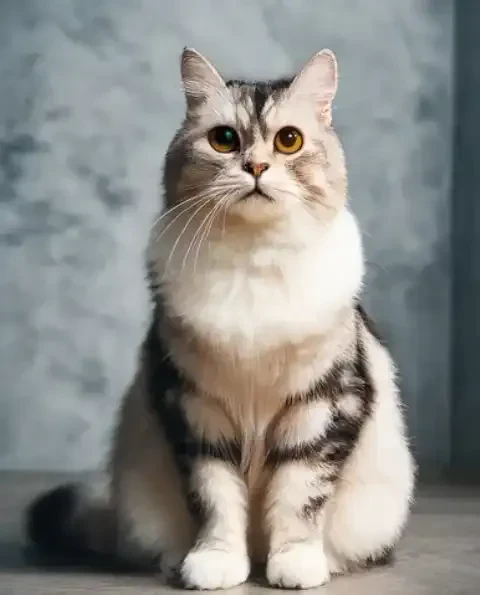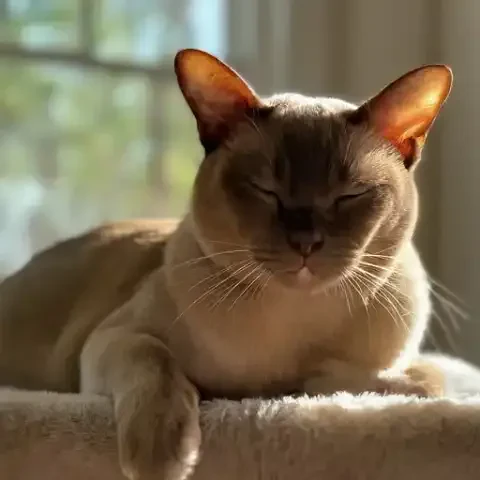Introduction
Cats have long held a special place in the hearts of people around the world. From ancient civilizations to modern-day households, the love for these enigmatic creatures knows no bounds. Their graceful demeanor, mysterious allure, and playful antics have captivated humans for centuries, earning them the title of beloved companions and cherished family members.
However, beneath their elegant exterior lies a fascinating world of diversity in personalities. Just like humans, cats exhibit a wide range of traits, quirks, and behaviors that make them unique individuals. From the affectionate lap cat to the independent explorer, each feline friend brings its own distinct charm and character to the table.
In this article, we delve into the enchanting realm of cat personalities, aiming to shed light on the myriad of traits that make each cat truly one-of-a-kind. Through exploration and celebration, we seek to unravel the mysteries of feline behavior and deepen our appreciation for the rich tapestry of personalities that exist within the feline world. Join us on this journey as we embark on a quest to uncover the unique traits and behaviors that make cats such beloved companions.
Understanding Cat Personalities
Cats, like humans, possess distinct personalities that shape their interactions and behaviors. These personalities are influenced by a variety of factors, including genetics, upbringing, and environment. Understanding these influences is key to comprehending the diverse range of traits exhibited by our feline friends.
Genetics, Upbringing, and Environment
Genetics play a significant role in determining a cat's personality. Certain breeds may have predispositions to specific traits, such as the outgoing nature of the Siamese or the calm demeanor of the Ragdoll. However, genetics alone do not dictate personality. Upbringing and environment also play crucial roles. Kittens raised in nurturing, stimulating environments with positive human interactions are more likely to develop social, confident personalities. Conversely, kittens raised in isolation or with negative experiences may exhibit shy or fearful behaviors.
Common Personality Traits in Cats
Cats display a wide array of personality traits, each contributing to their individual charm. Some common traits include:
Independent: Cats are known for their independent nature, often preferring to explore and roam on their own terms.
Affectionate: Many cats form strong bonds with their human companions and enjoy snuggling, purring, and seeking out affectionate interactions.
Playful: Playfulness is a hallmark of feline behavior, with cats delighting in chasing toys, pouncing on imaginary prey, and engaging in interactive games.
Aloof: Some cats may exhibit aloof or reserved behavior, appearing distant or uninterested in human interactions. However, they may still form deep bonds with their owners in their own subtle ways.
Importance of Recognizing Individual Differences
Just as every person is unique, so too is every cat. Recognizing and respecting these individual differences is essential for fostering positive relationships with our feline companions. What works for one cat may not work for another, and it's important to tailor our interactions and care to suit each cat's personality and preferences. By understanding and appreciating the diversity of cat personalities, we can deepen our connections with these fascinating creatures and enrich our lives in the process.
Exploring the Spectrum of Cat Personalities
Cats come in a variety of personalities, each with its own unique charm and quirks. From social butterflies to independent adventurers, let's delve into the diverse spectrum of cat personalities:
The Social Butterfly
These cats are the life of the party, thriving on interaction and attention from both humans and other animals. They eagerly seek out companionship, often following their owners around the house and eagerly participating in family activities. Social butterflies are known for their outgoing and affectionate nature, making them perfect companions for households seeking constant feline companionship.
Anecdote: Meet Whiskers, a charismatic tabby who brightens every room with his playful antics. Whiskers greets visitors with enthusiastic head bumps and loves nothing more than curling up in his owner's lap for a cuddle session. His friendly demeanor and love for attention make him the center of attention wherever he goes.
The Introvert
Contrary to their outgoing counterparts, introverted cats prefer solitude and independence. They may enjoy occasional affectionate moments but are equally content spending long hours lounging in quiet corners or observing the world from a distance. While they may not seek out attention as readily as social butterflies, introverted cats form deep bonds with their owners and appreciate their own space.
Anecdote: Luna, a sleek black cat, prefers the solace of her cozy cat tree to the hustle and bustle of family gatherings. While she may not actively seek out attention, Luna's quiet presence brings a sense of calm to her household. She enjoys quiet evenings curled up by the window, watching the world go by.
The Adventurer
Adventurous cats are curious explorers, always on the lookout for new sights, smells, and experiences. They eagerly investigate every nook and cranny of their environment, often finding themselves in unexpected places or embarking on daring escapades. These fearless felines thrive on mental and physical stimulation, making them ideal companions for owners who enjoy outdoor adventures or interactive play.
Anecdote: Meet Oliver, a daring orange tabby with an insatiable curiosity. Oliver loves nothing more than exploring the great outdoors, whether it's climbing trees, chasing butterflies, or embarking on neighborhood adventures. His boundless energy and adventurous spirit keep his owners on their toes.
The Lap Cat
Lap cats are the ultimate cuddle companions, reveling in physical affection and closeness with their owners. They eagerly seek out laps to curl up on, purring contentedly as they enjoy the warmth and security of human contact. Lap cats are masters of relaxation, transforming their owners' laps into cozy havens of comfort and companionship.
Anecdote: Bella, a fluffy Persian with soulful eyes, is the epitome of a lap cat. From the moment her owner sits down, Bella wastes no time in claiming her spot on their lap, purring contentedly as she nuzzles into their embrace. Her love for cuddling knows no bounds, making her the perfect companion for lazy Sunday afternoons.
The Hunter
These cats possess strong predatory instincts and a natural aptitude for hunting games. They excel at stalking, pouncing, and chasing, whether it's a feather toy, a laser pointer, or an unsuspecting insect. Hunters are always on the lookout for their next prey, channeling their innate instincts into playful activities that satisfy their need for mental and physical stimulation.
Anecdote: Shadow, a sleek black cat with piercing green eyes, is a formidable hunter both indoors and outdoors. With lightning-fast reflexes and razor-sharp focus, Shadow can turn even the most mundane play session into an exhilarating game of cat and mouse. His owner marvels at his prowess and enjoys watching him unleash his inner predator.
These profiles illustrate the rich diversity of personalities that exist within the feline world, each with its own unique traits and charms. Whether you're drawn to the social butterfly, the introvert, the adventurer, the lap cat, or the hunter, there's a feline friend out there waiting to steal your heart.
Factors Influencing Cat Personalities
The personalities of cats are shaped by a multitude of factors, ranging from genetics to environmental influences. Understanding these factors is essential for comprehending the diverse range of behaviors and traits exhibited by our feline companions.
Genetics and Breed-Specific Traits
Genetics play a significant role in determining a cat's temperament and behavior. Different breeds may have distinct personality traits that have been selectively bred over generations. For example, breeds like the Maine Coon are known for their friendly and sociable nature, while others, such as the Scottish Fold, may exhibit more laid-back and relaxed personalities. While genetics provide a foundation for a cat's personality, it's important to remember that individual variation within breeds is also significant.
Early Socialization Experiences
Early socialization experiences during kittenhood play a crucial role in shaping a cat's personality. Kittens that have positive interactions with humans, other animals, and various environments during their formative weeks are more likely to develop confident and sociable personalities. Conversely, kittens that are isolated or exposed to negative experiences may exhibit fearful or anxious behaviors later in life. Early socialization is essential for fostering well-adjusted and emotionally resilient cats.
Human Interaction and Environmental Enrichment
The quality and quantity of human interaction, as well as the level of environmental enrichment provided, significantly impact a cat's personality. Regular positive interactions with humans, such as petting, play sessions, and affectionate bonding moments, strengthen the bond between cats and their owners and contribute to the development of trusting and affectionate personalities. Similarly, providing environmental enrichment, such as toys, scratching posts, and interactive games, stimulates a cat's mind and body, preventing boredom and fostering healthy behaviors.
Health and Well-being Considerations
A cat's physical health and overall well-being can also influence its personality. Cats that are in good health and free from pain or discomfort are more likely to exhibit positive behaviors and interactions with their owners. Conversely, cats that are experiencing health issues or chronic pain may display changes in behavior, such as aggression, withdrawal, or decreased activity levels. Regular veterinary care, a balanced diet, and appropriate preventive measures are essential for maintaining a cat's health and supporting its overall well-being.
Understanding and considering these factors are crucial for providing optimal care and support for our feline companions. By recognizing the role of genetics, early socialization experiences, human interaction, environmental enrichment, and health considerations in shaping cat personalities, we can create nurturing environments that promote the development of happy, healthy, and well-adjusted cats.
Celebrating Diversity in Cat Personalities
Cats are as unique as the humans who adore them, each possessing their own set of quirks, preferences, and idiosyncrasies that make them truly one-of-a-kind. Embracing the diversity of cat personalities not only enriches our understanding of these fascinating creatures but also strengthens the bond we share with them.
Embracing the Quirks and Idiosyncrasies
Every cat has its own distinct personality traits and behaviors that set them apart from others. From the playful antics of a mischievous kitten to the dignified demeanor of a senior cat, it's these quirks and idiosyncrasies that make each feline companion special. By embracing and celebrating these unique characteristics, we honor the individuality of our beloved cats and foster deeper connections with them.
Highlighting the Joy and Enrichment
The diversity of cat personalities brings boundless joy and enrichment to cat-human relationships. Whether it's the affectionate purrs of a lap cat or the adventurous spirit of an explorer, each personality type offers its own brand of companionship and delight. By recognizing and appreciating the joy that different personalities bring into our lives, we open ourselves up to a world of love, laughter, and shared experiences with our feline friends.
Promoting Acceptance and Understanding
Just like humans, cats may have personalities that differ from the norm or challenge our expectations. It's important to promote acceptance and understanding of cats with unique personalities, whether they're shy and reserved or bold and outspoken. By approaching these differences with empathy and compassion, we create inclusive environments where all cats are valued and cherished for who they are.
Encouraging Responsible Pet Ownership
Responsible pet ownership entails respecting the individual needs and preferences of our feline companions. This means providing a nurturing environment that caters to their unique personalities, whether it's creating quiet spaces for introverted cats or engaging in interactive play for adventurous souls. By prioritizing the well-being and happiness of our cats and adapting our care routines to suit their individual needs, we demonstrate our commitment to being responsible and compassionate pet owners.
In conclusion, celebrating the diversity of cat personalities is not only a testament to the richness of the feline world but also a reflection of the deep bonds we share with our furry companions. By embracing their quirks, finding joy in their presence, promoting acceptance and understanding, and practicing responsible pet ownership, we honor the unique personalities of our beloved cats and create fulfilling relationships that last a lifetime.
Tips for Understanding and Nurturing Cat Personalities
Understanding and nurturing the unique personalities of cats require patience, observation, and a willingness to adapt to their individual needs. By paying attention to their body language, providing appropriate stimulation, and tailoring interactions, we can foster strong bonds and ensure the well-being of our feline companions.
Observing and Interpreting Cat Body Language
Cat body language is a rich source of information that can help us understand their feelings and preferences. By observing subtle cues such as ear position, tail movement, and vocalizations, we can gain insight into their mood and intentions. For example, a cat with flattened ears and a swishing tail may be feeling agitated or defensive, while a relaxed cat with half-closed eyes and a softly purring may be content and at ease. Understanding these cues allows us to respond appropriately and ensure positive interactions with our cats.
Providing Appropriate Mental and Physical Stimulation
Different personality types require varying levels of mental and physical stimulation to thrive. Social butterflies may benefit from interactive play sessions, puzzle toys, and opportunities for socialization with other pets or humans. Adventurous cats may enjoy access to outdoor enclosures or supervised outdoor exploration to satisfy their curiosity and need for exploration. Meanwhile, introverted cats may prefer quiet, indoor environments with plenty of cozy hiding spots and vertical spaces to climb and observe their surroundings. Tailoring enrichment activities to suit each cat's personality helps prevent boredom and encourages healthy behaviors.
Tailoring Interactions and Bonding Activities
Building strong bonds with our cats involves understanding their preferences and adapting our interactions accordingly. Some cats may enjoy lap cuddles and grooming sessions, while others may prefer interactive play or gentle head scratches. By observing their reactions and respecting their boundaries, we can create positive experiences that strengthen our bond and build trust over time. It's essential to let the cat take the lead in interactions and allow them to initiate contact on their terms.
Seeking Professional Advice or Support
In some cases, cats may exhibit behavioral issues or challenges that require professional intervention. Whether it's excessive aggression, litter box problems, or anxiety-related behaviors, seeking advice from a veterinarian or certified animal behaviorist can provide valuable insights and guidance. These experts can help identify underlying causes, develop behavior modification plans, and recommend appropriate management strategies to address the specific needs of each cat. Remember that seeking professional support is a proactive step towards ensuring the well-being and happiness of our feline companions.
In summary, understanding and nurturing cat personalities involve careful observation, thoughtful interaction, and a commitment to meeting their individual needs. By paying attention to body language, providing appropriate stimulation, tailoring interactions, and seeking professional advice when needed, we can create harmonious relationships and enrich the lives of our beloved cats.
Conclusion
Throughout this exploration, we've encountered the rich tapestry of personalities that exist within the feline world. From the social butterflies who thrive on interaction to the introverts who prefer solitude, each cat brings its own unique blend of traits and quirks to the table.
Recap of the Diverse Range of Personalities
We've witnessed the diversity of cat personalities, from the adventurous explorers to the cuddly lap cats and everything in between. Each cat is a unique individual, with its own preferences, behaviors, and idiosyncrasies that make it truly one-of-a-kind.
Call to Appreciate and Celebrate Uniqueness
As cat lovers, it's essential to appreciate and celebrate the uniqueness of each cat's personality. Whether they're bold and outgoing or shy and reserved, every cat deserves to be valued and cherished for who they are. By embracing their quirks and accepting their differences, we honor the beauty of diversity within the feline world.
Final Thoughts on Enriching Experiences
Living with and caring for cats with distinct personalities is an enriching experience that brings joy, laughter, and companionship into our lives. From the playful antics of a curious kitten to the soothing purrs of a contented lap cat, each moment spent with our feline friends is a treasure to be cherished.
In the end, the bond we share with our cats transcends words and defies explanation. It's a connection that goes beyond mere companionship, touching our hearts and souls in ways that only a true cat lover can understand. So let us continue to embrace the diversity of cat personalities, celebrate the uniqueness of each feline friend, and revel in the enriching experience of sharing our lives with these wonderful creatures.







